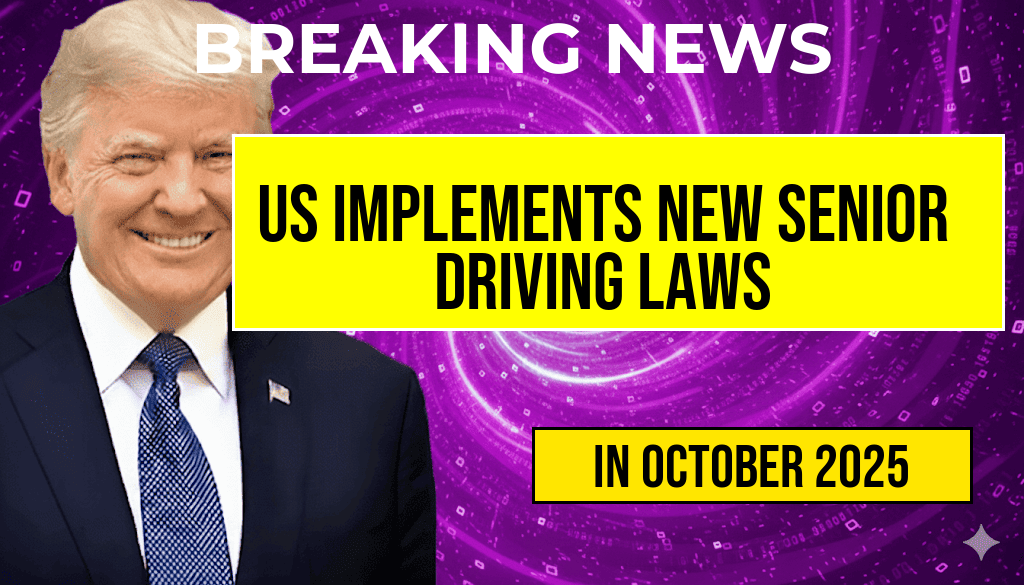The U.S. Department of Motor Vehicles (DMV) announced comprehensive updates to driving license regulations specifically targeting drivers aged 70 and older, set to take effect in October 2025. These changes aim to enhance road safety while accommodating the unique needs of senior drivers. Starting next year, individuals in this age group will face new testing and renewal procedures, including more frequent assessments of visual and cognitive abilities, as well as mandatory in-person renewals in many states. The initiative reflects a broader effort to balance mobility for seniors with the safety of all road users, responding to demographic shifts and increasing longevity among the aging population.
Enhanced Testing Requirements for Senior Drivers
Mandatory Cognitive and Vision Evaluations
Under the new regulations, drivers aged 70 and older will be required to undergo comprehensive cognitive assessments and vision tests as part of their license renewal process. While existing policies often mandate vision checks, the updated rules emphasize cognitive screening to identify potential impairments that could impair driving ability. These assessments aim to detect issues such as memory loss, slowed reaction times, or diminished decision-making skills, which are critical for safe driving.
Increased Frequency of Renewals
Previously, drivers in this age bracket could renew licenses every 8 years or more, depending on the state. The new regulations stipulate renewals every 4 years, with some states opting for even more frequent renewals to ensure ongoing fitness to drive. This change intends to catch emerging health issues sooner and provide opportunities for necessary interventions.
In-Person Renewals and Additional Testing
Many states will require mandatory in-person visits for license renewal, replacing or supplementing online or mail-in options. During these visits, drivers will undergo on-site testing, including practical driving evaluations in some jurisdictions, to assess their current driving capabilities directly. This move aims to prevent unsafe drivers from renewing their licenses without proper assessment.
Driving Simulations and On-Road Testing
To better evaluate driving skills, several states are exploring the integration of driving simulation tests and on-road evaluations. These assessments will measure reaction times, decision-making, and adherence to traffic laws, providing a more comprehensive picture of each driver’s fitness. While not universally mandated initially, these measures are expected to be phased in across multiple regions over the coming years.
States Adapting to New Regulations
| State | Renewal Frequency | Testing Requirements | Additional Notes |
|---|---|---|---|
| California | Every 5 years for drivers 70+ | Vision and cognitive tests; on-road evaluation optional | Mandatory in-person renewal |
| New York | Every 4 years for drivers 70+ | Vision test; cognitive screening in select counties | Driving simulation optional |
| Florida | Every 4 years for drivers 70+ | Vision and reaction time tests | On-road tests may be required based on screening outcomes |
Impact on Senior Drivers and Road Safety
Officials emphasize that these regulations are designed to promote safety without unduly restricting mobility. Many seniors rely heavily on their driving privileges for daily activities, healthcare appointments, and social engagement. The new policies include provisions for medical reviews and referrals to healthcare providers if assessments indicate potential issues.
Support Programs and Alternatives
- Educational resources on safe driving practices for seniors
- Referral programs for vision or cognitive health evaluations
- Enhanced access to public transportation and community services for those who need to reduce or cease driving
Community and Industry Reactions
Advocates for senior mobility acknowledge the importance of these updates but call for balanced implementation to prevent unnecessary disruptions. Meanwhile, transportation safety organizations highlight that early detection of impairments can significantly reduce accidents involving older drivers. Insurance companies are also adjusting policies, with some offering discounts for drivers who participate in approved refresher courses or health evaluations.
As states prepare to roll out these new regulations, driving license agencies are expected to launch public awareness campaigns to inform seniors about upcoming changes and available resources. The evolving landscape underscores a broader societal conversation about aging, independence, and safety on U.S. roads, with policymakers aiming to create a system that adapts proactively to demographic trends.
For more information on driving safety and senior mobility, visit Wikipedia’s page on Driving Safety and consult your state’s DMV website.
Frequently Asked Questions
What are the main changes to driving license regulations for seniors starting October 2025?
The new regulations require drivers aged 70 and older to undergo more frequent vision and health assessments and submit renewal applications in person at designated locations to ensure their continued safety on the road.
How will the renewal process differ for seniors under the new regulations?
Seniors will need to visit DMV offices in person for license renewal starting October 2025, and may be required to pass additional vision tests and medical evaluations as part of the process.
What documentation must seniors provide when renewing their driving license under these new rules?
Drivers aged 70 and older will need to present valid identification, proof of medical fitness, and may also need to provide vision test results or medical clearance certificates from healthcare providers.
Are there any exemptions or special considerations for seniors with certain health conditions?
Yes, seniors with specific health conditions or disabilities may qualify for special assessments or accommodations. They are advised to consult with their healthcare providers and the DMV to determine eligibility for tailored renewal procedures.
How can seniors prepare in advance for the updated licensing regulations?
Seniors should schedule regular health and vision checkups, ensure their medical documentation is up to date, and familiarize themselves with the renewal process at their local DMV to ensure a smooth transition starting October 2025.










